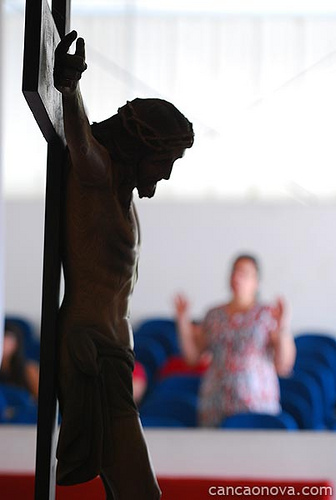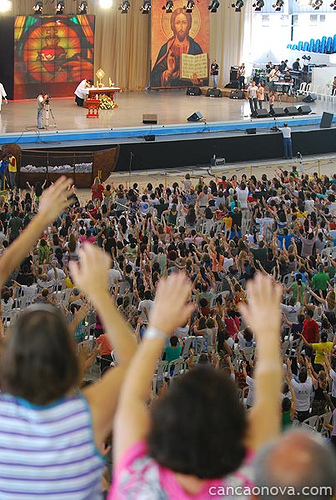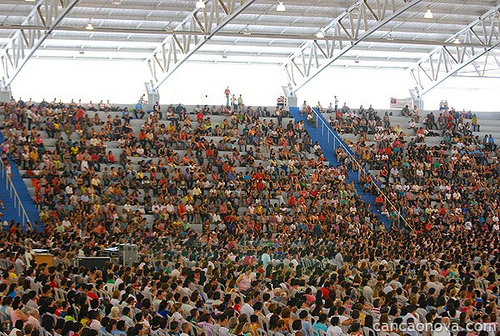I want you to look at the second reading and there you will notice one of the most controversial lists in US Catholicism. What you are reading there from St. Paul are some of what we now call the Charismatic gifts. These are unique realities that involve what some would call a supernatural manifestation in the natural of the power of God. In many parts of the Catholic world, especially that part outside North America and Western Europe these gifts are common. Here in the US they are looked at askance.
These comprise part of what is known as the Charismatic Renewal in English and is described in similar terms in other languages.
What are these gifts all about in Paul’s time and in ours? These gifts which, as you can see here, were considered a normal part of Christianity for the first centuries of our faith, became manifest again in Catholicism in 1967 during a retreat in Duquesne University. It was there a group of Catholic college students and their teachers prayed for and experienced the power of the Holy Spirit and became the first to manifest these gifts. This is an interesting fact because when I first met New Song Community founder: Fr. Jonas Abib, he told me that the the problem with the Church in the US is that it rejected the Charismatic renewal, but the strange thing is that it started here.
I believe he is right and I will explain that in a minute. In Catholicism there are two movements that I have  found to be mutually exclusive. I have never found anyone who is a member of one movement who is simultaneously a member of the other. That does not say that they don’t exist, but I have never found them. The movements are Liberation Theology and the Charismatic Renewal. This is a key element for those of us familiar with both forms of Catholicism. One leader of liberation theology in South America was silenced by the Vatican. The US secular press, as could expected, painted the Vatican as the bad guy in this dispute, but in fact, this form of liberation theology has a violent element in support of picking up arms in the name of the gospel. One priest reported to me that it is not uncommon in those circles to have people distribute communion saying “Vote for insert candidates name here” instead of “Body of Christ.”
found to be mutually exclusive. I have never found anyone who is a member of one movement who is simultaneously a member of the other. That does not say that they don’t exist, but I have never found them. The movements are Liberation Theology and the Charismatic Renewal. This is a key element for those of us familiar with both forms of Catholicism. One leader of liberation theology in South America was silenced by the Vatican. The US secular press, as could expected, painted the Vatican as the bad guy in this dispute, but in fact, this form of liberation theology has a violent element in support of picking up arms in the name of the gospel. One priest reported to me that it is not uncommon in those circles to have people distribute communion saying “Vote for insert candidates name here” instead of “Body of Christ.”
The Charismatic Renewal is more spiritually focused than materially focused and for that reason the two movements are mutually exclusive. For those of you who do not know this, our local Catholic college here in Boston is very strong on liberation theology. Franciscan University of Steubenville, OH is very strong on Charismatic spirituality and what little our local media understands at all about Catholicism has its roots in liberation theology.
Liberation Theology is about using the gospel for making political and material changes in our world.
The Charismatic Renewal is about the Holy Spirit doing the work of God through his people and as you can see from this list, the manifestations of the Spirit are not something that are easily accepted in an environment as cerebral as ours especially in New England.
The Charismatic gifts were common in the Church up until the beginning of the Fourth Century. It is easy to see why, this was the beginning of the Church and also a time a great persecution. They returned to the Church over various periods, returning again in 1967. That is also to see why we are now at the early stage of a very serious persecution of the Church in various parts of the world including the United States and especially in Boston.
 These gifts exist for this reason. It is important to know that the sacraments of initiation in the Church—baptism, confirmation and Eucharist are not tickets to a bus driven a priest to get you to Heaven. They are the door through which we enter into the Kingdom of God and then participate in the mission of the Church which is the salvation of souls. The gifts you see here are there to help strengthen the Church and its mission in service to God. In fact, many times in the gospels Jesus reminds us that our task is to bear fruit for the Kingdom, not to go along for the ride.
These gifts exist for this reason. It is important to know that the sacraments of initiation in the Church—baptism, confirmation and Eucharist are not tickets to a bus driven a priest to get you to Heaven. They are the door through which we enter into the Kingdom of God and then participate in the mission of the Church which is the salvation of souls. The gifts you see here are there to help strengthen the Church and its mission in service to God. In fact, many times in the gospels Jesus reminds us that our task is to bear fruit for the Kingdom, not to go along for the ride.
Maybe one minor example of this the unifying power of the gifts is: When I had my first visit to Brazil and my first encounter with Canção Nova we participated in a morning Eucharistic adoration with everyone praying in tongues. At that time I did not speak a word of Portuguese. For those who don’t understand this Portuguese is not a dialect of Spanish nor vice versa. As one priest explained to me Portuguese does have a similarity to spanish but it is a language unto itself with its own grammar and syntax. A person who speaks Spanish, but does not speak Portuguese will know when someone is speaking Portuguese because it sounds like Spanish but you can’t understand what they are saying.
Here I am surrounded by people who speak this language, but we are adoring Christ in using the gift of tongues. No one understands the language they are speaking but all understand they adoring Christ and this is a unifying element of the gift of tongues. You might say that how can a group of people be speaking different languages and be unified. It is because then the prayer language turns into a form of music that is on pitch, on key and is just as central a part of the gift as the prayer language. When 20,000 people from various countries are praying in different languages and it is unified in tone and pitch, that is powerful and virtually impossible to duplicate, as I understand, without lots of practice. This strengthens the community and its mission. This would be an example of the power for the church of one of these gifts.
The Charismatic Renewal is real but it fell on hard times in the United States because even though the  Church hierarchy in Rome embraced it, the US hierarchy, although did not reject it, many priests and bishops did not enthusiastically embrace it either allowing it to continue without strong leadership in many parts of the country. Brazil received the Charismatic Renewal through the work of an American Priest still serving there. The Church hierarchy embraced it as did many of the people. Canção Nova, for example, has a very strong relationship with the hierarchy of Brazil. Indeed, one man in our Church hierarchy who is quite familiar with Canção Nova is the Papal Nuncio to the US.
Church hierarchy in Rome embraced it, the US hierarchy, although did not reject it, many priests and bishops did not enthusiastically embrace it either allowing it to continue without strong leadership in many parts of the country. Brazil received the Charismatic Renewal through the work of an American Priest still serving there. The Church hierarchy embraced it as did many of the people. Canção Nova, for example, has a very strong relationship with the hierarchy of Brazil. Indeed, one man in our Church hierarchy who is quite familiar with Canção Nova is the Papal Nuncio to the US.
These gifts you see Paul describe are very real and are used for the benefit of the Church everyday. Maybe we as Americans can be more open to them especially during this time of growing anti-Catholic persecution especially here in the New England area.
They are real, and are there to strengthen the mission of the whole Church. As they were in Paul’s time a normal part of Christian life, so they are in our time called to be a normal part of Catholic life. Yet, in order to be fully experienced participants we need to be in strong relation with our Church hierarchy who need to be able to lead those who participate in Charismatic spirituality.
You can see an example of this in a video that I recorded at the 40th Anniversary of the Charismatic Renewal at the New Song (Canção Nova) Mother House in Cachoeira Paulista, Brazil.
God Bless You,
Fr. Robert J Carr
Fr. Carr is the pastor at St. Benedict Parish in Somerville, MA and is the editor of this Blog. He is an alliance member of the New Song Community.


